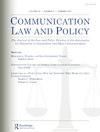利贝尔与实验室:科学家与诽谤
IF 0.2
Q4 LAW
引用次数: 4
摘要
科学家越来越多地卷入诽谤指控。有时,他们在同行评审的科学期刊上发表的文章的准确性争议中成为被告。在其他情况下,科学家是原告,对那些在大众媒体上攻击他们、损害他们声誉的人提起诉讼。这两种情况都代表着压制科学家言论的努力,通常是因为他们的研究威胁到既定的商业利益,也威胁到科学探究。本文考察了这两种趋势。它建议,对于期刊文章,法院承认科学辩论特权,这在一些司法管辖区正在出现。它提供的证据表明,声誉攻击正在恐吓科学家,导致他们从事较少有争议的研究。它指出,在努力就公众关注的问题保持激烈辩论的过程中,法院允许对科学家进行残酷的批评,这会将研究人员的声音逐出公共领域,从而产生相反的效果。本文章由计算机程序翻译,如有差异,请以英文原文为准。
Libel and the Lab: Scientists and Defamation
Scientists are increasingly involved in defamation claims. Sometimes they are defendants in disputes over the accuracy of articles published in peer-reviewed scientific journals. In other instances, scientists are plaintiffs, filing suits against those who have attacked them in the popular media, harming their reputations. Both situations represent efforts to quell scientists’ speech, generally because their research threatens established commercial interests, and they pose a threat to scientific inquiry. This article examines these two trends. It recommends that, for journal articles, courts recognize a scientific debate privilege, which is emerging in some jurisdictions. It presents evidence that reputational attacks are intimidating scientists, causing them to pursue fewer controversial lines of research. It notes that, in their efforts to maintain vigorous debate on matters of public concern, courts are allowing brutal criticism of scientists that is having the opposite effect by driving researchers’ voices out of the public sphere.
求助全文
通过发布文献求助,成功后即可免费获取论文全文。
去求助
来源期刊
CiteScore
0.60
自引率
33.30%
发文量
7
期刊介绍:
The societal, cultural, economic and political dimensions of communication, including the freedoms of speech and press, are undergoing dramatic global changes. The convergence of the mass media, telecommunications, and computers has raised important questions reflected in analyses of modern communication law, policy, and regulation. Serving as a forum for discussions of these continuing and emerging questions, Communication Law and Policy considers traditional and contemporary problems of freedom of expression and dissemination, including theoretical, conceptual and methodological issues inherent in the special conditions presented by new media and information technologies.

 求助内容:
求助内容: 应助结果提醒方式:
应助结果提醒方式:


